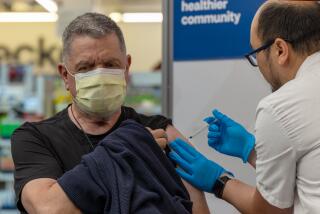State Law No Bar to Hospitals’ Participation, Health Director Says : California Asks to Take Part in Federal Study on AIDS
- Share via
WASHINGTON — California’s health director has told federal public health officials that the state law prohibiting the AIDS antibody test without an individual’s written consent would not prevent California hospitals from participating in a federal study testing anonymous blood samples from hospital patients around the country for AIDS infection, The Times has learned.
Further, Dr. Kenneth Kizer, director of the California Department of Health Services, has asked the federal Centers for Disease Control to allow California hospitals to participate in the program, which is trying to obtain a more accurate picture of the AIDS epidemic.
“We will be happy to assist you identifying candidate hospitals in California,” he wrote CDC Director Dr. James O. Mason in a recent letter obtained by The Times.
Ethics Issue Weighed
The national study, which hopes to add about 12 more hospitals this year to the five currently enrolled, was begun several months ago after much soul-searching over the ethics of testing individuals without their knowledge, or a way to inform them later of test results.
The program uses random blood samples routinely collected from patients admitted to hospitals for reasons unrelated to AIDS. The specimens, ordinarily discarded, are labeled by age, race and sex only, with no identification of individuals. Similarly, the CDC has refused to publicly identify hospitals that participate.
Initially, CDC officials assumed that the California law precluded them from enlisting California hospitals in the program. In addition to requiring written consent to perform the test, the law also mandates separate written authorization for disclosure of test results.
“Other provisions . . . permit anonymous testing at alternate test sites and establish penalties for unauthorized disclosure of . . . test results,” Kizer wrote. “Prior to enactment of these statutes, this department supported the proposed measures as necessary to ensure that the blood supply of the state remain safe, and to ensure the privacy and protection of individuals from possible untoward consequences of unauthorized use of test results.”
Sees No Conflict
He continued: “On reviewing these statutes, and the proposed research protocol, I do not see that the two conflict. Since the proposed testing would not link results with individuals, we do not believe that such testing would violate California laws.”
Dr. Timothy Dondero, chief of the surveillance and evaluation branch of the CDC’s AIDS program, said Sunday that he was “delighted” at California’s willingness to participate, and was eager to receive proposals from interested hospitals in the state.
“Ultimately, it comes down to whether the hospitals themselves are willing to participate, but it doesn’t hurt to have a vote of confidence from the health department,” Dondero said.
The CDC hopes the data will eventually provide the public health community with a clearer sense of the overall magnitude of AIDS infection, as well as pinpointing trends over time and potential “problem” regions not previously identified.
‘Window on Community’
Dondero, who described the study as “sort of a window on the community in a non-invasive way,” said the CDC believes “this type of monitoring in levels and trends is really more important to local and regional and health authorities than it is to the federal level.”
“In areas where there is a high prevalence of infection, such as San Francisco, there already has been a community mobilization,” Dondero said. “One of the aspects of this kind of surveillance is to sensitize the local public health authorities and the community, and focus attention on what has to be done. San Francisco already knows.”
Thus, he said, “it would probably be more helpful to have hospitals participating in areas where the AIDS situation is not quite as well recognized.”
Statistical Projection
Until now, figures cited to describe the extent of infection in this country--1 million to 2 million Americans--represent a statistical projection based on known AIDS cases, the number of homosexuals and intravenous drug users--the groups primarily afflicted with AIDS--and AIDS infection among those who have been treated at clinics for drug abuse and sexually transmitted diseases.
AIDS, or acquired immune deficiency syndrome, is caused by a virus that destroys the body’s immune system, leaving it powerless against certain cancers and otherwise rare infections. It can also invade the central nervous system, causing severe neurological disorders. It is transmitted through anal and vaginal sexual intercourse, through the sharing of unsterilized hypodermic needles and by woman to fetus during pregnancy.
Thus far, more than 31,000 Americans have contracted AIDS, and more than 17,000 have died.
More to Read
Sign up for Essential California
The most important California stories and recommendations in your inbox every morning.
You may occasionally receive promotional content from the Los Angeles Times.










